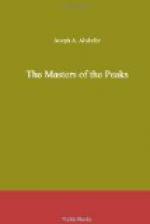The hours passed and noon arrived. Willet had not stirred. He did not sleep, but he rested nevertheless. His great body was relaxed thoroughly, and strength, after weariness, flowed back into his veins. Presently his head moved forward a little and his attitude grew more intent. A slight sound that was not a part of the wilderness had come to him. It was very faint, few would have noticed it, but he knew it was the report of a rifle. He knew also that it was not a shot fired in battle. The hunters, as he had surmised, were abroad, and they had started up a deer or a bear.
But Willet did not stir nor did his eyelids flicker. He was used to the proximity of foes, and the distant report did not cause his heart to miss a single beat. Instead, he felt a sort of dry amusement that they should be so near and yet know it not. How Tandakora would have rejoiced if there had been a whisper in his ear that Willet, Robert and Tayoga whom he hated so much were within sound of his rifle! And how he would have spread his nets to catch such precious game!
He heard a second shot presently from the other side, and then the hunter began to laugh softly to himself. His faint amusement was turning into actual and intense enjoyment. The Indian hunters were obviously on every side of them but did not dream that the finest game of all was at hand. They would continue to waste their time on deer and bear while the three formidable rangers were within hearing of their guns.
But the hunter was still silent. His laughter was wholly internal, and his lips did not even move. It showed only in his eye and the general expression of his countenance. A third shot and a fourth came, but no anxiety marred his sense of the humorous.
Then he heard the distant shouts of warriors in pursuit of a wounded bear and still he was motionless.
Willet knew that the French and Tandakora suspected no pursuit. They believed that no American rangers would come among the lofty peaks and ridges south of the border, and he and his comrades could lie in safe hiding while the hunt went on with unabated zeal. But he was sure one day would be sufficient for the task. That portion of the wilderness was full of game, and, since the coming of the war, deer and bear were increasing rapidly. Willet often noted how quickly game returned to regions abandoned by man, as if the wild animals promptly told one another the danger had passed.
Joyous shouts came now and then and he knew that they marked the taking of game, but about the middle of the afternoon the hunt drifted entirely away. A little later Tayoga awoke and sat up. Then Willet moved slightly and spoke.
“Tandakora’s hunters have been all about us while you slept,” he said, “but I knew they wouldn’t find us.”
“Dagaeoga and I were safe in the care of the Great Bear,” said the Onondaga confidently. “Tandakora will rage if we tell him some day that we were here, to be taken if he had only seen us. Now Lennox awakes also! O Dagaeoga, you have slept and missed all the great jest.”




